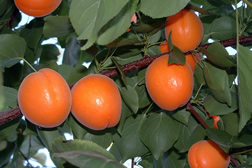This page has been archived and is being provided for reference purposes only. The page is no longer being updated, and therefore, links on the page may be invalid.
|
Delicious "Kettleman" Apricots to Debut Soon
By Marcia WoodJuly 15, 2005
Flavorful new apricots known as "Kettleman" may soon begin showing up in supermarket produce sections. This juicy, sweet-tart fruit is the newest addition to the series of delectable stone fruits from expert tree fruit breeders with the Agricultural Research Service's (ARS) San Joaquin Valley Agricultural Sciences Center in Parlier, Calif., about 200 miles north of Los Angeles.
What makes Kettleman apricots so special is their attractive deep-orange skin, pleasing taste, smooth texture and alluring aroma. Also, they ripen early: Kettleman is ready to harvest from about May 15 through May 25, which is good news indeed for apricot fans who wait all winter for the first fruits of spring.
In 1992, ARS research geneticist Craig A. Ledbetter at Parlier selected Kettleman--then known only by its breeding number, 883001--as a front-runner among other promising apricot seedlings. He evaluated more than 1,000 Kettleman trees and their fruit before deciding to make this new variety available to breeders, researchers and fruit growers.
Ledbetter named the fruit for the small city of Kettleman, Calif., near which test trees were planted. Kettleman lies in the San Joaquin Valley, about halfway between Los Angeles and San Francisco. The trees should thrive in regions of the valley where other early-season apricots, like Earlicot and the ARS-developed Castlebrite, already flourish.
California growers produce nearly all of the nation's harvest of apricots for fresh-market sale and for processing into dried fruit, nectar, puree, jam, jelly, pastry filling, candy and other foods and beverages.
Apricots provide iron, potassium, fiber, vitamin C and beta-carotene which the human body converts into vitamin A.
Tree fruit researchers, breeders and nurseries can contact Ledbetter at (559) 596-2817 or cledbetter@ars.usda.gov for grafting materials--June buds in spring and summer or dormant scionwood in winter--that they can use to grow their own Kettleman trees.
ARS is the U.S. Department of Agriculture's chief scientific research organization.

